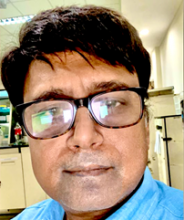
Postdoctoral Training (Immunology): The Cleveland Clinic Ohio, USA
Doctoral (Biotechnoloy): Jadavpur University Kolkata, India
Masters’ (Microbiology): M.S. University Baroda, India
We work on early host-microbe interactions, that ultimately define the predisposition and/or outcomes of diseases. The human epithelial surface is continuously exposed to microbes. This epithelium presents the first line of defence against external threats. This defence is not physical barrier alone; but extremely complex array of receptors, signalling cascades and effectors that are key to innate immunity. We are interested to understand how epithelial and innate immune cells interact with themselves and bacteria with specific focus on bacterial Outer Membrane Vesicles. For this we study nutrition, microbiota and biofilms with specific emphasis on Quorum signalling and the cross talk with innate immune determinants. We are also investigating human lung alveolar innate immunity and cross talk between type 2 pneumocytes and macrophages, using a novel model. These studies help to contribute to the understanding of lethal multiple drug resistant nosocomial infections and sepsis, especially neonatal sepsis which kills thousands of babies in early life. We are currently part of the National Neonatal Sepsis Research Consortium (DBT), one of the largest research programs in India in collaboration with AIIMS, TSHTI, IGIB, NII and ICGEB. I enjoy productive interactions/collaborations with industry including Avesthagen (B'lore), ITC Ltd. (B'lore), Thermo Fisher Scientific (USA) and start-ups like Barefeet Analytics (Pune). I am also a nosocomial infection control expert and offer consultancy services for antibiotic stewardship and clinical infection control.
2008 - present ; Assistant Professor, Special Centre for Molecular Medicine, Jawaharlal Nehru University, New Delhi, India
2009-2012 - Faculty-In-Charge, Mass Spectrometry Laboratory, Advanced Instrumentation Facility, Jawaharlal Nehru University, New Delhi, India
2003-2008 (Feb.) - Faculty Scientist, Indian Institute of Technology, Kharagpur, India
1997-2002 - Postdoctoral Fellow, Department of Immunology & Department of Gastroenterology, The Cleveland Clinic Foundation, USA.
Merlin Bumpus Best Investigator Award, USA, 2001.
Prof. Sanjoy K. Bhattacharya, Bascom Palmer Eye Institute, Florida, U.S.A (Lipidomics).
Prof. Giovanni Di Bonaventura, School of Medicine and Health Sciences, "G. d'Annunzio" University of Chieti-Pescara, Italy (Host-pathogen Interactions).
National Collaborations:
The Indian Neonatal Sepsis Consortium (AIIMS-Del, NII, ICGEB, TSHTI, IGIB & IIIT).
Dr. Jeeva Sankar, MD, DM. Division of Neonatology, All India Institute of Medical Sciences, New Delhi
Dr. Venkat Panchagnula, National Chemical Laboratory, Pune (Laser Desorption Ionization Mass Spectrometry).
1. Lahiri P., Krishnaraj S., Gogoi P., Roy A. and Ghosh D. (2025). Metabolomics of the Kynurenine Pathway by Laser Desorption Ionization Mass Spectrometry (LDI-MS). Methods in Mol. Biol.(Metabolomics) , 2925: 185–20. https://doi.org/10.1007/978-1-0716-4534-5_13
2. Lahiri P., Gogoi P., and Ghosh D. (2023) Single-Step Capture and Targeted Metabolomics of Alkyl-Quinolones in Outer Membrane Vesicles (OMVs) of Pseudomonas aeruginosa. Methods in Mol. Biol. (Lipidomics) 2625, 201-2016.
3. Pompilio A, Crocetta V, Ghosh D et al. (2016) Stenotrophomonas maltophilia phenotypic and genotypic diversity during a 10-year colonization in the lungs of a cystic fibrosis patient. Frontiers in Microbiology 2016; 7: 1551
4. Pluháček T, Lemr K, Ghosh D, Milde D, Novák J and Havlíček V (2016) Characterization of Microbial Siderophores by Mass Spectrometry. Mass spectrometry Reviews. 35: 35-47
5. Ghosh D., Salzman NH, Huttner KM, Paterson Y, Bevins CL. Protection against enteric salmonellosis in transgenic mice expressing a human intestinal defensin. Nature. 422:522-6.Commentary: Ganz T. Microbiology: Gut defence. Nature. 422:478-9.
6. Ghosh D., Porter E, Shen B, Lee SK, Wilk D, Drazba J, Yadav SP, Crabb JW, Ganz T, Bevins CL. Paneth cell trypsin is the processing enzyme for human defensin-5. Nat. Immunol. 3:583-590. Commentary: Zasloff M. Trypsin, for the defense. Nat Immunol. 2002 Jun;3(6):508-10.
Ghosh, D. (2011). Pathogenesis of Malabsorption Syndrome: Issues on Gut Flora and Innate Immunity. In: Ghoshal, U Malabsorption Syndrome in Tropics. Delhi: Elsevier. 179-204.
Ghosh, D. (2010). Probiotics and Intestinal Defensins: Augmenting the First Line of Defense in Gastrointentinal Immunity. In: Nair, G. B. and Takeda, Y. Probiotic Foods in Health and Disease. Delhi: Oxford & IBH Publishing Co. 61-74.
Gogoi P., Lahiri P., Roy A., Ghosh D. (2025) The Multifactorial Pathobiology of Lipidic Quorum Signaling Molecules of Pseudomonas aeruginosa. Lipid Analysis in Biology, Health, and Disease . Elsevier Academic Press. Paperback ISBN: 9780443191169 eBook ISBN: 9780443291227 (in press)
1. Selective Detection and Analysis of Small Molecules Ghosh D., Dharware D. and Panchagnula V. Jawaharlal Nehru University, New Delhi and Central Scientific and Industrial Research (CSIR), New Delhi. (Ind) 407/DEL/2011; (EPO) EP2676287A2 ; (USPTO) 20130323849A1. Technology Ready for Transfer.